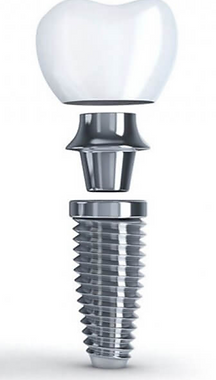HSG Dental Implant Centre
Specialist Dental Implant Centre focusing on full arch and complex implantology.

What are dental implants?
Dental implants are artificial tooth roots that provide a bone supported base for sturdily replaced teeth. They are an effective alternative treatment to conventional methods such as bridges and dentures in people who suffer from missing teeth, failing teeth or chronic dental problems. They feel and function much like naturally teeth and as a result have become a standard of care for single, multiple, and full arch tooth replacement. Because they look, feel and function like natural teeth, dental implants are quickly becoming the new standard in tooth replacement.
Dental implants achieve their strength and natural feel due to the material properties. They are made of medical grade titanium alloys which, over a period of healing, fuse with the living bone found in the jaw. This fusion results in a stable platform which can be used to support one or more teeth, removable dentures, or full arches of teeth. The fusion ensures no movement, rocking, or slippage which is commonly found in removable dentures. There are also no issues eating with them and they do not require regular repairs.
Below we go into further detail about the various ways implants can help patients with broken down, failing, or missing teeth.
What is a Dental Specialist?
Generally 3 or more years of undergraduate study plus 4 years of dental school are required to become a general dentist. Becoming a specialist requires an additional 3-6 years of post-graduate study, depending on the specialty. Specialists have dedicated their careers to a narrower scope of dentistry allowing for more detailed study.
In Canada there are 10 recognized dental specialties, each with its own very specific area of specialization. Below is a list a very brief description of specialties closely related to implant dentistry:
Prosthodontist: Specialist primarily focused on the reconstruction and replacement of broken down and missing teeth. This is accomplished with the use of dental implants, crowns, bridges, and dentures.
Oral Surgeon: Specialist focused on the surgical procedures of face, mouth, and jaw areas.
Periodontist: Specialist focused on diagnosis, prevention, and treatment of periodontal and peri-implant diseases. They also place implants, perform soft tissue grafting, and more.

Anatomy of a Dental Implant
The term "dental implant" is often used to describe an implant supported tooth, teeth, or denture, but there is more to it than just that. Dental implants are commonly broken into three parts:
Root Form Implant:
A medical grade titanium alloy screw which serves as a prosthetic root for your new tooth/teeth. This is the piece that fuses (osseointegrates) with the bone of the jaw.
Abutment:
This is a permanent piece that inserts into the implant and acts as a connection adapter. It acts to support and retain the custom made teeth. While the abutment can be removed by your doctor it is rarely done. The abutment is most often made of pure medical grade titanium
Prosthesis (Crown/Bridge/Full Arch):
The prosthesis is the part of the restoration you can see. Depending on the scenario it can take the shape of a tooth, multiple teeth, or a full arch of teeth. Final prostheses can be made from a multitude of materials, but is most commonly made of porcelain, zirconia, titanium, or acrylic.

The popularity of dental implants comes from their versatility. You can use them to replace anywhere from a single tooth through to a full upper and/or lower arch of teeth. If you considering replacing a full arch, you may be a perfect candidate for All-On-Four treatment. In this situation our implant specialists will place four implants and then attach a full arch of teeth, giving the procedure its name (all teeth, only four implants).
Just as dental implants have become as the preferred choice for tooth replacement, a single interdisciplinary specialist centre has become the preferred model for implant treatment . Our team of specialists and experts works together under one roof, with a fully equipped, onsite lab, to build beautiful smiles in a way that works for our patients.
One team. One cost. One location. That’s the real benefit of dental implants from the Hickman Specialist Group.

Single Implants
This is the most common dental implant procedure. When a single tooth is missing or needs to be extracted, a dental implant can be placed to act as a root for the missing tooth. After a period of healing a custom abutment and crown is fabricated. It is sometimes possible to attach the crown on the day of implant placement, but this is determined on a case by case basis.
These implants are designed to look, feel, and function like a natural tooth.

Multiple Implants
Traditionally when more than two teeth in a row were missing the only options were leaving a gap, a denture, or a long span bridge. With dental implants a more natural look, feel, and function can be achieved.
Unlike a removable partial denture, dental implants are fused with the bone and provide a solid base to chew against. They do not need to be removed and maintenance is similar to existing teeth. Dental implants are quickly becoming the gold standard for the replacement of multiple missing teeth.

Full Arch Implants
When all of the teeth in an arch are missing or non-restorable, a full arch implant supported or retained prosthesis can be considered. This type of prosthesis is sometimes referred to as "All-On-4" or "Teeth in a Day". In these situations an entire arch of teeth (upper/lower) can be restored with as few as two implants. There are many designs and configurations that we can fabricate to match patient anatomy and budgets. Given this area covers a wide variety of options we have a separate page dedicated to the subject.

